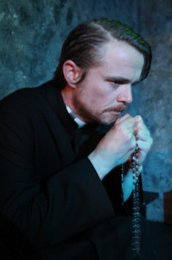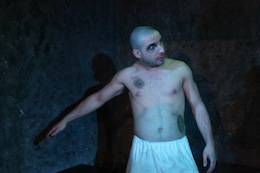The programme for The Last Crusader, a play by Barry McKinley currently directed by Karl Shiels at Theatre Upstairs, contains a quote from the Gospel of Luke: “Keep on seeking, and you will find, for everyone who seeks, finds. And to everyone who knocks, the door will be opened.” The door Christ speaks of is metaphorical; for McKinley, in this play, the door is very real. It is the thing that separates two priests in a Soviet prison cell from the world at large. Every time it opens, the characters become a step closer to finding out their fate.
 Barry McKinley’s plays have a habit of popping up in unexpected places: a South American jungle in Lost City, a New York elevator in the case of Small Box Psychosis, a retirement home outside Las Vegas in Elysium, Nevada. It as if he requires a certain distance and remoteness in order to plunge deep into his characters. The Last Crusader feels like a work from another era entirely, as rogue counter-revolutionary priests test their wits against the apparatus of Soviet totalitarianism from a cramped jail cell. Though it is slightly jarring to see a representation of a priest as an agent for change, if there is a nostalgia running through this production, it is a longing for the heyday of the spy novel, the double agent, the age of intrigue and duplicity where nothing was quite how it seemed.
Barry McKinley’s plays have a habit of popping up in unexpected places: a South American jungle in Lost City, a New York elevator in the case of Small Box Psychosis, a retirement home outside Las Vegas in Elysium, Nevada. It as if he requires a certain distance and remoteness in order to plunge deep into his characters. The Last Crusader feels like a work from another era entirely, as rogue counter-revolutionary priests test their wits against the apparatus of Soviet totalitarianism from a cramped jail cell. Though it is slightly jarring to see a representation of a priest as an agent for change, if there is a nostalgia running through this production, it is a longing for the heyday of the spy novel, the double agent, the age of intrigue and duplicity where nothing was quite how it seemed.
Donncha Crowley plays Meara, the 'Last Crusader' in question, a virile, lecherous Irish priest versed in Latin, amongst other languages, and prone to lapse into song at any moment. His prison partner is Blake (Patrick O’Donnell), a shellshocked, cassock-wearing English curate to a powerful priest in the area. The duo are imprisoned for undermining the regime and eager to find out the identity of ‘Thursday’, the elusive military intelligence boss who’s desperate to quell popular discontent being fomented by the likes of Meara.
Designers Andy Cummins' and Laura Honan’s vision of a Soviet prison is quite stark: the cell is empty, bar cement beds and a loudspeaker from which the prison guards shout commands in Russian. The State is personified by two goons: Anthony Morris as Gleck, an albino general and Tiernan Kearns, a black-eyed, bald-headed ‘thief’ named Tomas who spends time in the cell with the two priests. There is a visceral quality to Shiels’ direction of the quartet, as he especially maximises the violence lingering in Meara, most notably in a scene where he tortures Tomas with an extended crotch grab. He also makes great use of the door from which the prison guards come in and out, turning it into an implement that divides the priests from reality.
 McKinley’s playwriting is often primarily committed to humour, specifically dark humour. There is plenty of razor-sharp writing here and the elegant performance of Crowley, especially in its climax, lifts the production immensely. But The Last Crusader feels somewhat like a departure for McKinley. Its very seriousness seems to be its undoing. For all its twists and turns, The Last Crusader never quite reaches the dramatic heights it aspires to (an imprisoned enemy of the state carrying a switchblade in his pants’ pocket is one of a few eyebrow raisers), nor does it fully conjure life behind the Iron Curtain. We are given one fascinating character that Graham Greene might have been proud of: Meara, a righteous soldier of the Lord fighting godless Communism from the inside. Yet, just as Meara ultimately fails in his struggle with the State, so to does The Last Crusader provoke without fully reaching its potential.
McKinley’s playwriting is often primarily committed to humour, specifically dark humour. There is plenty of razor-sharp writing here and the elegant performance of Crowley, especially in its climax, lifts the production immensely. But The Last Crusader feels somewhat like a departure for McKinley. Its very seriousness seems to be its undoing. For all its twists and turns, The Last Crusader never quite reaches the dramatic heights it aspires to (an imprisoned enemy of the state carrying a switchblade in his pants’ pocket is one of a few eyebrow raisers), nor does it fully conjure life behind the Iron Curtain. We are given one fascinating character that Graham Greene might have been proud of: Meara, a righteous soldier of the Lord fighting godless Communism from the inside. Yet, just as Meara ultimately fails in his struggle with the State, so to does The Last Crusader provoke without fully reaching its potential.
Donald Mahoney
Small Box Psychosis by Barry McKinley is running simultaneously at Theatre Upstairs (lunchtimes). Read Donald Mahoney's review here.